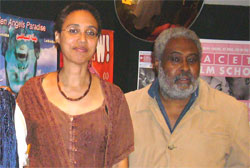Teaching the Diaspora on the Big Screen
The African Diaspora Film Festival, founded by a TC husband-and-wife team, has become a major NYC event. And yet the focus is still educational
Fifteen years ago, when Reinaldo Barroso-Spech first started tracking down films about Africa and the African Diaspora, it was to use them as a tool to interest his public school students in learning foreign languages. It wasn't long, however, before Barroso-Spech, a TC graduate with a doctorate in foreign languages and education, realized that adults were eager to watch the films, too-and that there were few venues in
Thus was born the African Diaspora Film Festival and a labor of love that has turned out to be equal parts both.
"We accepted the challenge of bringing something different," says Barroso-Spech. "The first year people said no one will come. We had to learn everything, and it has been intense. Not being from the industry, it takes effort."
"We needed to identify ways to connect with films and filmmakers, and then determine what we want to see and get them to partner with us," adds TC CEO&I Financial Director Diarah N'Daw Spech, Barroso-Spech's wife and his partner in organizing the Festival.
Over the years, more than 100,000 people have attended the Festival, as it has grown from a seven-day, 25-film event to a 17-day event that shows 100 films. What began as home-grown effort is now recognized as one of the important film festivals of its genre in the Tri-State area-an annual November happening that is written up in Variety and which is now a source of programming for television stations such as Starz!, BET J, and CUNY TV. For the past five years, during Black History Month in February, the Brooklyn Academy of Music shows the best films of the festival. And right now, films from previous African Diaspora Film Festival editions are being shown on the Manhattan Neighborhood Network every Thursday at 12:30 p.m., through the end of November. The selections include Frantz Fanon: His Life, His Struggle, His Work, a documentary about the founder of Africa's first psychiatric clinic who became a spokesman for the Algerian revolution against French colonialism; Aces, a 17-minute drama of a young man who is jailed for murder after he kills his father to protect his mother; and Gulpilil: One Red Blood, a documentary about the life of legendary Aboriginal actor and Australian icon David Gulpilil.
As both the Festival's title and these films suggest, the focus is on films that are truly about the experience of Africans or people of African descent, rather than on those that are simply set in
"One of the goals, aside from bringing diversity into this experience, was to create a teaching structure within the Festival to expose the largest number of students possible to the films and to show educators how to use the films in the classroom as a teaching tool," says Barroso-Spech. Through a component in the Festival called "The School Program," students and teachers view the films at the various venues around town as a supplement to their learning of language, history and cultural issues.
In addition, Barroso-Spech teaches a course at Teachers College that is designed to help teachers use the films to create lesson plans. In the African Diaspora Film Festival Course (sponsored by The Center for African Education and offered through the Center for Educational Outreach & Innovation), which Barroso-Spech team-teaches with George Bond, TC's Willam F. Russell Professor of Anthropology and Education, students not only watch the films, but also get to meet the filmmakers.
The creators want to take the experience even further. While the Film Festival has expanded to other cities around the country-including Jersey City, Chicago and Washington, D.C.-it has also become part of the Curacao African Diaspora Film Festival on the Netherlands Antilles island in late June and early July. Working with that nation's House of Culture, N'Daw-Spech and Barroso-Spech want to bring a group from the
"Last year, we showed a film about Piri Thomas's life and his work with youth groups in
Tickets to this year's African Diaspora Film Festival, which will represent the global Black experience from more than 40 countries, will be available for purchase online in advance of the November 23rd kickoff at www.NYADFF.org.
Some of the films slated to appear in the 15th Annual African Diaspora Film Festival include A Winter Tale by Frances-Anne Solomon, the story of a Black men's support group set in Toronto, Canada; Youssou N'Dour: Return to Goree a musical documentary that follows the internationally renown Senegalese singer in his quest to give a concert of his own repertoire adapted to jazz and gospel on the Senegalese island of Goree; and No Time To Die, a comedy from Ghana about the tribulations of an undertaker as he searches for a wife.
The films, which will include world, North American, U.S., and New York City premieres, will be shown through December 9th at, among other venues, the Anthology Film Archives in the East Village, The Riverside Theater and the Thalia on the Upper West Side, the Clearview Theater on 62nd Street and Broadway and the Schomburg Center in Harlem. Some of the films being shown have also been presented at film festivals at
A complete listing of the films will be available on the Web site www.NYADFF.org beginning October 25th. Registration to the African Diaspora Film Festival course is still open with the first class meeting October 26, 2007. For more information visit http://www.nyadff.org/workshops.html.
Published Thursday, Oct. 18, 2007
